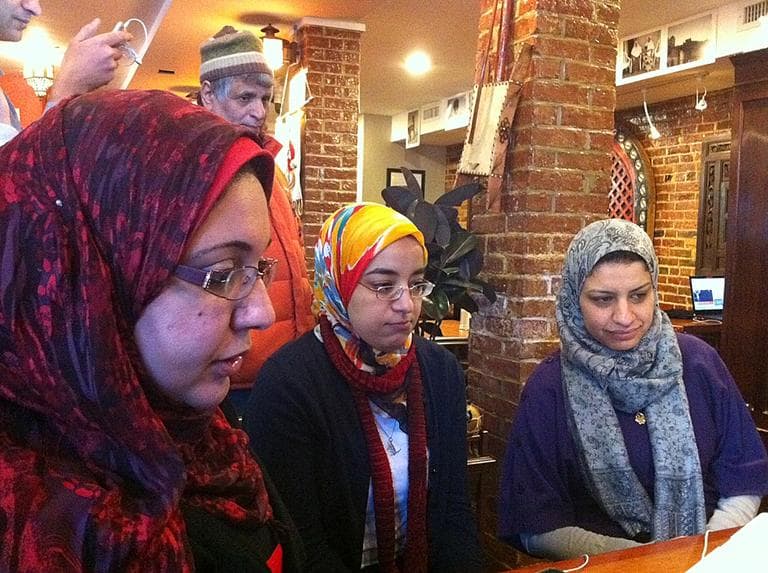Advertisement
Watching From Afar, Egyptians Decry Mubarak's Speech
Resume
Watching their homeland from afar are some 4,000 Egyptians in Massachusetts. Some gathered in a cafe in Central Square Thursday to watch the speech they'd hoped would change everything. On Friday, that dream of change came when it was announced that President Hosni Mubarak was stepping down from office.
Like many Egyptians, Dina El-Zanfaly and her friends were giddy with expectation. They thought Mubarak would step down.
"I have a thesis to work-on. I want him to step down. And let's have a stable situation," El-Zanfaly said.
El-Zanfaly is getting a master's degree in architecture at MIT. She may be laughing at this point, but she's been taking this uprising very seriously. For the last two weeks, she's been glued to the news, and staging her own protests in Boston.
"He's trying to play at people's emotions. This is his last hope. And I hope the next speech will be, 'I'm out.' He should leave."
Almira Hussein, Egyptian graduate student
And she's been getting angry at the way the Egyptian regime and some American pundits have questioned whether Egypt — and the young revolutionaries — are ready for Democracy.
"That's really unfair. Have you seen that crowd? Have you seen all these educated people," she said. "We have been quiet for 30 years. He has been suffering for 30 years. Now it is time to get our right[s]."
El-Zanfaly huddled with five Egyptian friends around their laptops in the basement of the Andala Cafe to watch Mubarak's speech.
The students and professors — all in their late 20s and early 30s — analyzed each part of the speech. They were disappointed Mubarak was reading from notes, not looking into the camera, that it looked pre-recorded. Then it became clear — Mubarak would not step down.
To the group in Cambridge, Mubarak's speech was absurd and disappointing.
"It wasn't what we expected or what we hoped for the entire day," said Almira Hussein, a 29-year-old graduate student at Boston University.
"He's trying to play at people's emotions," Hussein said. "This is his last hope. And I hope the next speech will be, 'I'm out.' He should leave."
Hussein's older brother, Islam, is 33 and a professor at Worcester Polytechnic Institute. He said the speech made him feel even more determined that Mubarak "has to go."
Islam has been in the U.S. more than a decade and he's never thought of returning to live and work in Egypt, because of its corruption, he said. Instead, he thought he could help his country by building bridges between the West and Egypt. But this uprising has changed that.
"It's a very different situation right now. And if everything goes the way I will like it to go, I'll go back. I will do my part," Islam said.
Until then, Islam and his friends are worried about their loved ones back home. They'll spend more sleepless nights and anxious days watching the news from their laptops.
This program aired on February 11, 2011.